#dale carnegie cartoon
Text
(Download PDF) How to Win Friends and Influence People in the Digital Age Writen By Dale Carnegie
Read PDF How to Win Friends and Influence People in the Digital Age Ebook Online PDF Download and Download PDF How to Win Friends and Influence People in the Digital Age Ebook Online PDF Download.
How to Win Friends and Influence People in the Digital Age
By : Dale Carnegie
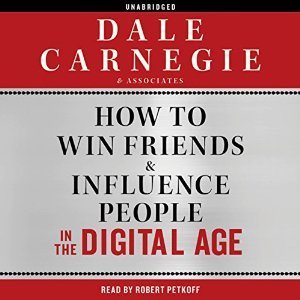
DOWNLOAD Read Online
DESCRIPTION : Celebrating the seventy-fifth anniversary of the original landmark bestseller How to Win Friends and Influence People, comes an up-to-the-minute adaptation of Carnegie?s timeless prescriptions for the digital age.Dale Carnegie?s principles have endured for nearly a century. Since its original publication in 1936, his timeless classic How to Win Friends and Influence People has gone on to sell 15 million copies. Now, introducing new listeners to Carnegie?s words of wisdom, comes How to Win Friends and Influence People in the Digital Age, a new guide for a new era.Dale Carnegie could never have predicted the trajectory that new media would take, and the ways that the simple television screen would be adapted into computers and handheld communication devices. He didn?t know the term ?social media? and Facebook was something not even dreamed of in Buck Rogers cartoons. And yet his lessons remain relevant for everyone who communicates online today. In fact, with problems such as cyber
0 notes
Text
Book Review - How to Stop Worrying and Start Living
Saturday, July 29, 2017
Author of the book - Dale Carnegie
Publication - Vermilion London

“How to Stop Worrying and Start Living by Dale Carnegie caters a time tested solution manual and delves deep to identify and promises to circumvent all seemingly insurmountable humanely problems to cure a much disturbing emotion called Worry.”
My life had already found itself in a phase of suffocating quagmire and a devastating delirium had made me despondent about life; only until I was advised by a certain kind fellow user of Quora to read Dale Carnegie’s timeless book of wisdom, “How to Stop Worrying a Start Living”, which I have savoured for a year and has end to be one of the gems I own.
Like every other emotion, “Worry” happens to the be one which has been a perennial peril without marking its existence in a certain era of history; and that goes to say that worry is a timeless phenomena and so is this book.
Now, this man Dale Carnegie has many things to teach to banish worries from your life; and he teaches in a way that even a layman can understand, i.e., by explaining each and everything in detail; and in that case he also explains “How to read this book”.
The book has been divided into many parts and their chapters and every chapter has a four line summary and every part has a nutshell that helps a reader to re-examine everything already read. This book covers every single problem or threat that can worry human beings. Either it is worrying about acquiring low grades in your high school or it is about the losses your organization has faced that is discomforting you; either it is the worry of your child’s upbringing and how he / she would turn out to be as an adult or it is the worry of your old parent / grandparent’s health; either it is a worry about the physical stress that is bothering your body or about the emotional turmoil that is wrecking your mind every second; this book caters a solution to every such problem.
Having said that, this book can better be used as a detector of your worries. There is this clichéd yet essential quote by Elbert Hubbard coined in 1915 that says, “When life gives you lemon, make lemonade.” This book made me think, perhaps I don’t know about the lemons. And that is what this book has achieved for me in the progression of the time I took to read it. It has made me identify my troubles and has given utmost solutions to those problems, which, by now, look trifle to me.
This book can also be used as a precautionary wisdom even if one isn’t surrounded by worries, because that’s the best time one can grasp the lessons from the book that a rather disturbed mind can’t.
The book manages to identify your problems (no matter how little they are), preaches homiletic lectures, throws bombastic quotes, befriends you at few occasions, delivers humanely solutions, also inspires one to diminish worry by quoting examples of the people who have fought the worry and came strong out of it; and does almost everything to see it vanish into the vortex of wisdom it offers.
All in all, why to wait for the worry to come, when one can avoid it by using this reference book of a billion wisdom!
With this plodding book review of “How to Stop Worrying and Start Living”, I would like to dedicate this frivolously made cartoon sketch to the author Dale Carnegie, who has changed my life for better with his writing and right now inspires me while he gets busy making lemonades out of lemons that the life has given him. Thank you for the wonderful work, sir.
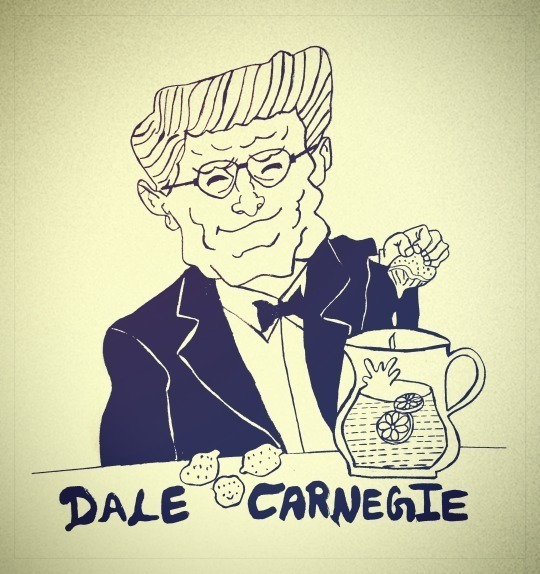
#dale carnegie#how to stop worrying and start living book review#how to stop worrying and start living by dale carnegie#how to stop worrying and start living#book review#how to win friends and influence people#elbert hubbard#dale carnegie cartoon#dale carnegie caricature#fan art#fan cartoon#fan tribute#dale carnegie tribute#fan work#lemonade#when life gives you lemons
1 note
·
View note
Photo
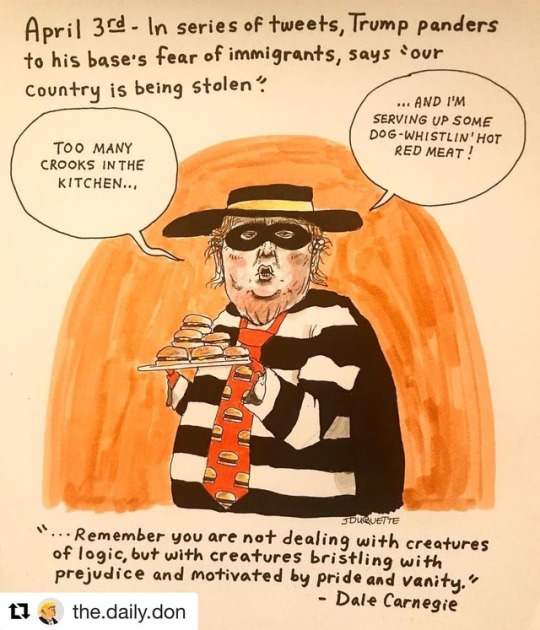
#Repost @the.daily.don: Day 438.1: In which Amazons come and Washington Posts go, but the Pied Piper of Prejudicial Paranoiacs always goes back to his favorite number. #resist #magaisformorons #shitholepresident #stablegenius #nobannowall #dailydrawing #thedailydon
#resist#thedailydon#repost#nobannowall#dailydrawing#magaisformorons#stablegenius#shitholepresident#@jrduquette#editorial cartoon#vanity#dale carnegie#literary quote#fear of immigrants#donald trump#prejudice
4 notes
·
View notes
Text
9 people tag game
Tagged by @nocturnal. I finally got around to it, thank you so much 😅💖.
Last song: “CØDE” by Shinee
Currently reading: "How To Win Friends and Influence People" by Dale Carnegie. It sounds odd, but it's something I do need to learn, because I know now through work that I haven't been good at making people like me, at all. Though some examples in the book are quite dated, I think it still teaches some very valuable lessons.
Currently watching: Star Wars: The Clone Wars. I made a deal with my brother that I'll watch this if he watched Attack on Titan. He's binged all 3 seasons of AoT now so I gotta keep my end of the deal lol. I'm enjoying it though, I'm on season 3 at the moment and I think the politics is very well written for a children's cartoon. I'm also keeping up with The Falcon and The Winter Soldier, which is a lot more nuanced than I expected.
Last movie: Zack Snyder's Justice League. I like it, it's a lot better than the 2017 version. Not gonna lie...I was a little sad to see the Blackpink song removed, but we all know it's gotta go, it was so jarring to begin with.
Currently craving: Korean food. Especially the non-spicy soups right now...like Sundaeguk or Doenjjang jjigae 🍲.
Tagging: @souhaiite, @dyosmyth, @minuutti, @24kocylinder, @namsjoon, @ominous-meme, @togur0, @yorunosei, @major-con-fusion
8 notes
·
View notes
Text
THE CUCKOO CLOCK CONSPIRACY
January 13, 1951

“The Cuckoo Clock Conspiracy” (aka ”The Cuckoo Clock”) is episode #114 of the radio series MY FAVORITE HUSBAND broadcast on January 13, 1951.
This was the 16th episode of the third season of MY FAVORITE HUSBAND. There were 31 new episodes, with the season ending on March 31, 1951.
Synopsis ~ Liz bought George's Christmas present, a cuckoo clock, with a rubber check, and now she needs to figure out a way to make good on it so the store owner won't repossess the clock.
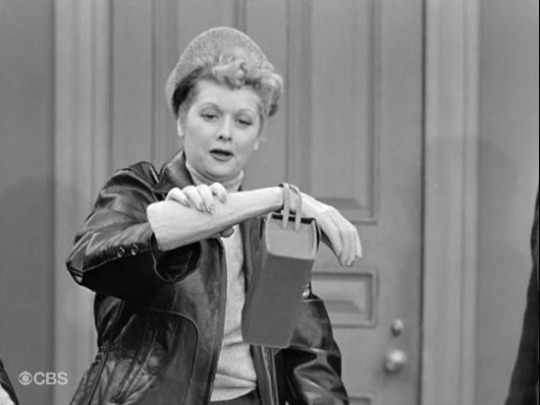
Parts of this script concerning the cuckoo clock where later used in “The Kleptomaniac” (ILL S1;E27), filmed on March 7, 1952, and first aired on April 14, 1952.
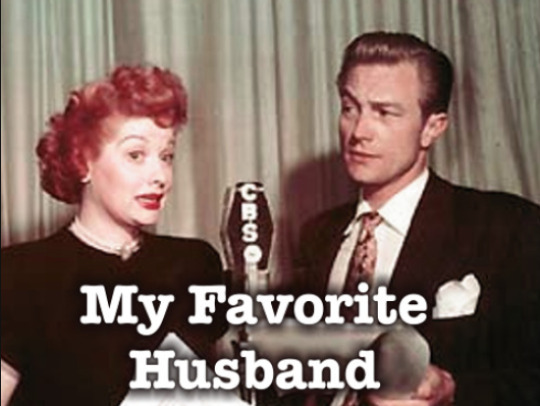
“My Favorite Husband” was based on the novels Mr. and Mrs. Cugat, the Record of a Happy Marriage (1940) and Outside Eden (1945) by Isabel Scott Rorick, which had previously been adapted into the film Are Husbands Necessary? (1942). “My Favorite Husband” was first broadcast as a one-time special on July 5, 1948. Lucille Ball and Lee Bowman played the characters of Liz and George Cugat, and a positive response to this broadcast convinced CBS to launch “My Favorite Husband” as a series. Bowman was not available Richard Denning was cast as George. On January 7, 1949, confusion with bandleader Xavier Cugat prompted a name change to Cooper. On this same episode Jell-O became its sponsor. A total of 124 episodes of the program aired from July 23, 1948 through March 31, 1951. After about ten episodes had been written, writers Fox and Davenport departed and three new writers took over – Bob Carroll, Jr., Madelyn Pugh, and head writer/producer Jess Oppenheimer. In March 1949 Gale Gordon took over the existing role of George’s boss, Rudolph Atterbury, and Bea Benaderet was added as his wife, Iris. CBS brought “My Favorite Husband” to television in 1953, starring Joan Caulfield and Barry Nelson as Liz and George Cooper. The television version ran two-and-a-half seasons, from September 1953 through December 1955, running concurrently with “I Love Lucy.” It was produced live at CBS Television City for most of its run, until switching to film for a truncated third season filmed (ironically) at Desilu and recasting Liz Cooper with Vanessa Brown.
MAIN CAST
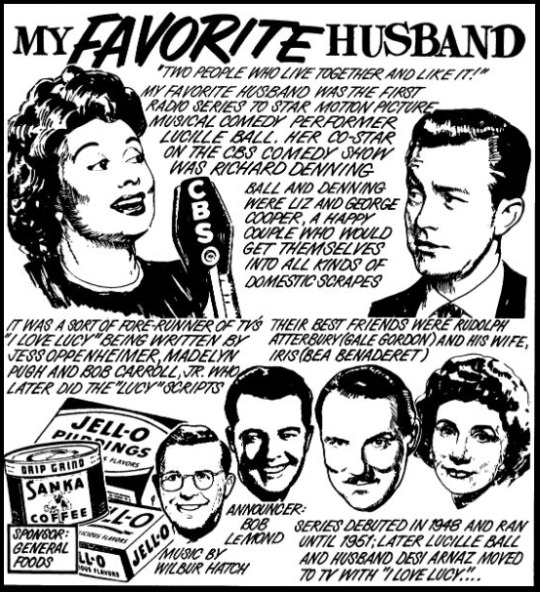
Lucille Ball (Liz Cooper) was born on August 6, 1911 in Jamestown, New York. She began her screen career in 1933 and was known in Hollywood as ‘Queen of the B’s’ due to her many appearances in ‘B’ movies. With Richard Denning, she starred in a radio program titled “My Favorite Husband” which eventually led to the creation of “I Love Lucy,” a television situation comedy in which she co-starred with her real-life husband, Latin bandleader Desi Arnaz. The program was phenomenally successful, allowing the couple to purchase what was once RKO Studios, re-naming it Desilu. When the show ended in 1960 (in an hour-long format known as “The Lucy-Desi Comedy Hour”) so did Lucy and Desi’s marriage. In 1962, hoping to keep Desilu financially solvent, Lucy returned to the sitcom format with “The Lucy Show,” which lasted six seasons. She followed that with a similar sitcom “Here’s Lucy” co-starring with her real-life children, Lucie and Desi Jr., as well as Gale Gordon, who had joined the cast of “The Lucy Show” during season two. Before her death in 1989, Lucy made one more attempt at a sitcom with “Life With Lucy,” also with Gordon.
Richard Denning (George Cooper) was born Louis Albert Heindrich Denninger Jr., in Poughkeepsie, New York. When he was 18 months old, his family moved to Los Angeles. Plans called for him to take over his father’s garment manufacturing business, but he developed an interest in acting. Denning enlisted in the US Navy during World War II. He is best known for his roles in various science fiction and horror films of the 1950s. Although he teamed with Lucille Ball on radio in “My Favorite Husband,” the two never acted together on screen. While “I Love Lucy” was on the air, he was seen on another CBS TV series, “Mr. & Mrs. North.” From 1968 to 1980 he played the Governor on “Hawaii 5-0″, his final role. He died in 1998 at age 84.
Bea Benadaret (Iris Atterbury) was considered the front-runner to be cast as Ethel Mertz but when “I Love Lucy” was ready to start production she was already playing a similar role on TV’s “The George Burns and Gracie Allen Show” so Vivian Vance was cast instead. On “I Love Lucy” she was cast as Lucy Ricardo’s spinster neighbor, Miss Lewis, in “Lucy Plays Cupid” (ILL S1;E15) in early 1952. Later, she was a success in her own show, “Petticoat Junction” as Shady Rest Hotel proprietress Kate Bradley. She starred in the series until her death in 1968.
Ruth Perrott (Katie, the Maid) was also later seen on “I Love Lucy.” She first played Mrs. Pomerantz, a member of the surprise investigating committee for the Society Matrons League in “Pioneer Women” (ILL S1;E25), as one of the member of the Wednesday Afternoon Fine Arts League in “Lucy and Ethel Buy the Same Dress” (ILL S3;E3), and also played a nurse when “Lucy Goes to the Hospital” (ILL S2;E16). She died in 1996 at the age of 96.
Bob LeMond (Announcer) also served as the announcer for the pilot episode of “I Love Lucy”. When the long-lost pilot was finally discovered in 1990, a few moments of the opening narration were damaged and lost, so LeMond – fifty years later – recreated the narration for the CBS special and subsequent DVD release.
Gale Gordon (Rudolph Atterbury) does not appear in this episode, but his character is mentioned.
GUEST CAST
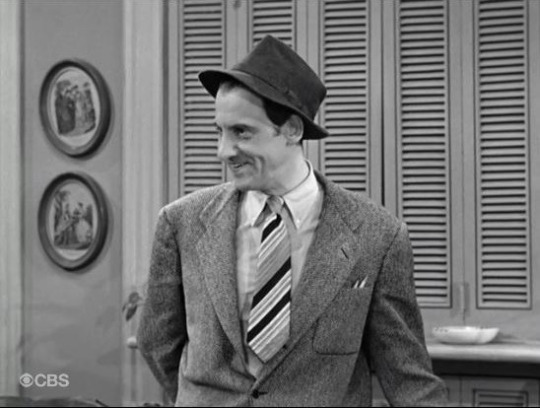
Hans Conried (Mr. Haskell, the Jeweler) first co-starred with Lucille Ball in The Big Street (1942). He then appeared on “I Love Lucy” as used furniture man Dan Jenkins in “Redecorating” (ILL S2;E8) and later that same season as Percy Livermore in “Lucy Hires an English Tutor” (ILL S2;E13) – both in 1952. The following year he began an association with Disney by voicing Captain Hook in Peter Pan. On “The Lucy Show” he played Professor Gitterman in “Lucy’s Barbershop Quartet” (TLS S1;E19) and in “Lucy Plays Cleopatra” (TLS S2;E1). He was probably best known as Uncle Tonoose on “Make Room for Daddy” starring Danny Thomas, which was filmed on the Desilu lot. He joined Thomas on a season 6 episode of “Here’s Lucy” in 1973.
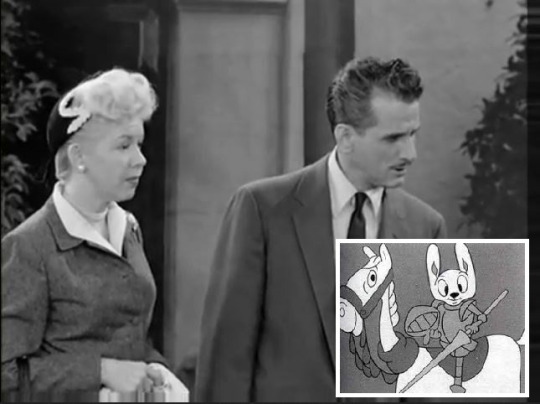
GeGe Pearson (Mrs. Haskell, the Jeweler’s Wife / Miss Russell, George’s Secretary) did two other episodes of “My Favorite Husband.” She will play a New York City tourist in “Lucy Visits Grauman’s” (ILL S5;E1) in 1955. She did the episode with her husband, Hal Gerard. The two actors were married in real-life. In 1956 the couple returned to CBS to appear in the same episode of “Damon Runyon Theatre.” She is perhaps best remembered as the voice of Crusader Rabbit. The couple died just a year apart in 1975 and 1976.

June Foray (Marie, the Beautician) was born June Lucille Forer in 1917 and was best known as the voice of such animated characters as Rocky the Flying Squirrel, Natasha Fatale, Cindy Lou Who, Witch Hazel in the Bugs Bunny cartoons, Granny in the Tweety Bird cartoons, and many, many others. She provided the bark of Fred the dog on Season 6 of “I Love Lucy.”

Ken Christy (Police Officer) later played the detective investigating the new tenants in “Oil Wells” (S3;E18) and will play the dock agent who directs Lucy to the helicopter that lowers her onto the deck of the S.S. Constitution in “Bon Voyage” (S5;E13). Christy was also featured on the TV series "Meet Corliss Archer” on CBS.
THE EPISODE
ANNOUNCER: “As we look in on the Cooper’s, it’s morning. George is at breakfast. Liz is in the kitchen talking to Katie the Maid.”
Liz compliments Katie with the goal of getting a loan of $14.95. She explains that she bought George a cuckoo clock for Christmas using a check with no money in the account. To prevent George from finding out, Liz wrote the check on an account at another bank - one where she hasn’t got an account - and could face jail.
In the dining room, Liz cuddles up to George with the same compliments she used on Katie! They smooch. George realizes that Liz is buttering him up for money. Liz directly asks George for a loan of $15 but banker George reminds her that borrowing money is a slippery slope into debt.
LIZ: “Look, Dale Carnegie, I need the money.”
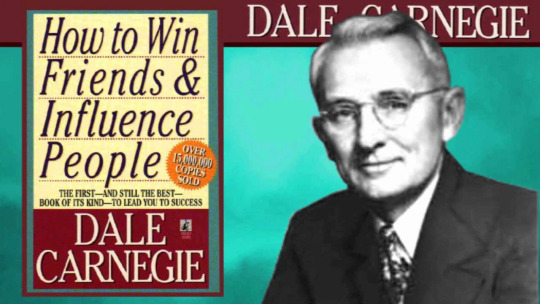
Dale Carnegie (1888-1955) was the developer of courses in self-improvement, salesmanship, corporate training, public speaking, and interpersonal skills. He was the author of the best-sellers How to Win Friends and Influence People (1936) and How to Stop Worrying and Start Living (1948), as well as several other books.
George reminds Liz that she made a New Year’s resolution to pay him $25 if she went over budget, so in giving her the loan, she would actually owe him $40! Liz tells him to forget the whole deal - she will find the money elsewhere.
At the beauty salon, Liz asks beautician Marie (Gege Pearson) where to find Iris Atterbury. Iris is having a mud pack which cracks upon hearing Liz wants a loan. She was just getting ready to ask Liz for a loan, too. It seems that Rudolph and George stated the new year on an economy wave.
LIZ: “I guess it’s in the air. Darn those Russians, anyway.”
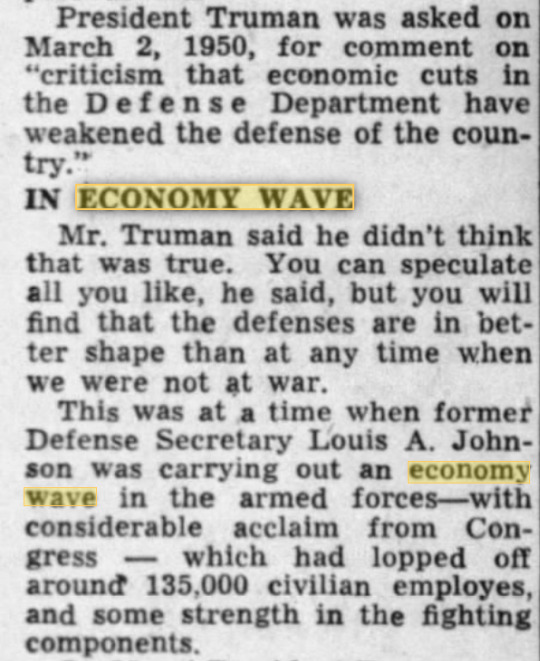
In 1950 and well into early 1951, the US Government committed to what was known as an ‘economy wave’ in order to save money that might be used for civil defense and bolstering European strength during the cold war with Russia. This economy wave extended to all facets of American business, including Hollywood, so it would have been a topic familiar to the writers of “My Favorite Husband” in early January 1951.
Liz explains her dilemma to Iris, who suggests she phone the jeweler and ask him to hold the check a few days. Liz thinks it is worth a try and calls Mr. Haskell (Hans Conried), who declines to hold the check a moment longer. Liz turns on the tears. Mrs. Haskell (Gege Pearson) gets on the line - she’s unsympathetic to tears. Liz and Iris rush off to get the clock out of George’s office before it is repossessed!

Wilbur Hatch’s play-off music is “As Time Goes By” written by Herman Hupfeld in 1931. It became famous when it was featured in the 1942 Warner Brothers film Casablanca performed by Dooley Wilson as Sam (”Play it again, Sam.”) The song was likely chosen to tie-in with the episode’s clock theme.
End of Part One

Announcer Bob LeMond does a live commercial, giving a recipe for a quick dessert using Jell-O.
Part Two
ANNOUNCER: “As we look in on the Coopers once again, Liz is speeding to George’s office to make off with the cuckoo clock before Mr. Haskell, the jeweler, arrives to repossess it. Meanwhile, George Cooper in his office is just going out to lunch.”
George asks his secretary, Miss Russell (Gege Pearson), to wind the cuckoo clock while he is out. After George leaves, she tries, but overwinds it. She takes it to Haskell’s to be fixed while George is out to lunch.

Liz and Iris arrive and can’t find George, Miss Russell, or the cuckoo clock. They assume that Mr. Haskell has gotten there first and repossessed the clock! They head towards Mr. Haskell’s Jewelry Shop.

There they see the clock in the window! Mr. Haskell explains that the clock in the window isn’t hers, but one just like it. He is a nervous wreck, thanks to a busy Christmas season. Liz still thinks that the window clock is hers, but Mr. Haskell insists it isn’t and won’t give it to her unless she pays for it. She and Iris leave in a huff.
Outside they scheme to get what they think is their clock back. Liz will divert Mr. Haskell while Iris sneaks the clock out of the store. Iris is scared, but reluctantly agrees. A whistle will be the signal that Mr. Haskell isn’t looking.

Liz tells him she is shopping for Mr. Atterbury, who wants to buy his wife a present. Deciding on a diamond, a clueless Liz guesses that she wants 200 carats! When Mr. Haskell whistles at the high carat-count, Iris mistakes it for the signal and tries to come in! Liz blocks the door! When Haskell goes to the back room for a diamond, Liz suddenly realizes she doesn’t known how to whistle, so calls to the back room asking him to repeat it for her! Iris gets in and out just as...
MR. HASKELL (returning to the shop): “Would you like me to whistle a chorus of “Come to the Stable, Mabel”?
LIZ: “No, thanks! Well, I’ll be running along now! Bye!”
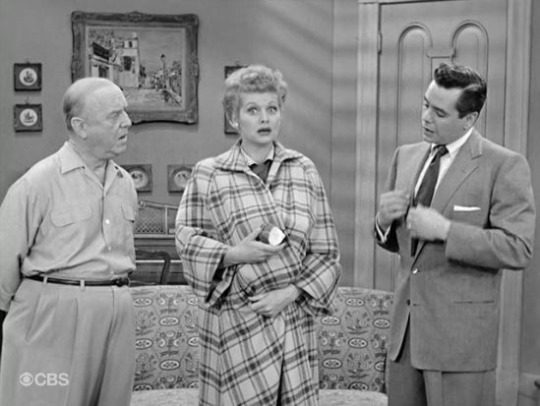
Liz dashes out of the shop and hides the cuckoo clock under her coat!
At the bank, Liz is greeted by Miss Russell, who tells her George isn’t back from lunch yet. They are shocked to discover that the cuckoo clock is back on the wall. They realize they have stolen Mr. Haskell’s new clock and must return it before he notices it is gone.
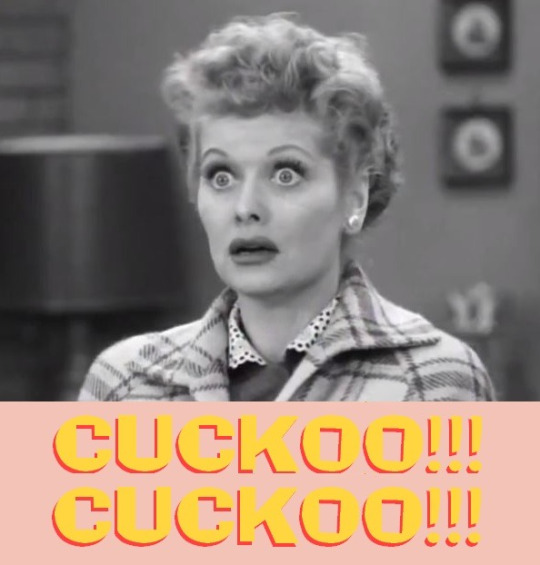
They arrive at the Haskell’s and find a Policeman (Ken Christy) there. Liz quickly hides the clock under her coat, but it continually ‘cuckoos’ loudly in the presence of the officer! Just as she’s about to be arrested for theft, Liz settles the matter by writing Mr. Haskell a post-dated check for January 20th - 1953!

Lucille Ball could not have known it at the time, but one day earlier, on January 19, 1953, she gave birth to her son, Desi Jr. and on the same evening, Lucy Ricardo gave birth to Little Ricky. On January 20, 1953, headlines like the one above dominated the nation’s newspapers.
End of Episode!
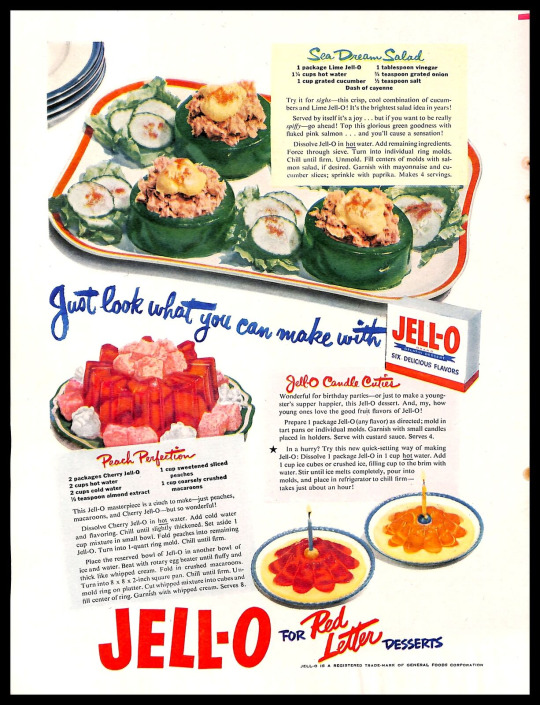
Bob LeMond does another live Jell-O commercial and reminds listeners to look for their ads in leading January magazines.
[Oops! While announcing the episode’s credits, Bob LeMond mistakenly says “Hans Conried played by Mr. Haskell” instead of the other way around. There is background laughter by the other cast members and LeMond starts to laugh a bit while finishing his announcements.]
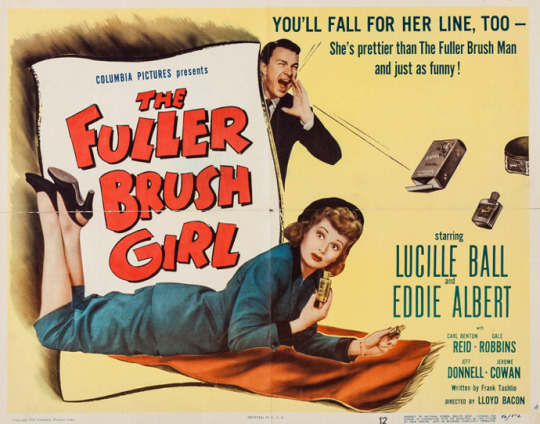
ANNOUNCER: “Be sure to watch for Lucille Ball as a would-be cosmetics dealer in her latest picture ‘The Fuller Brush Girl’.”
#Lucille Ball#My Favorite Husband#Richard Denning#Bea Benadaret#Ruth Perrott#Gege Pearson#Hans Conried#Ken Christy#June Foray#The Fuller Brush Girl#Dale Carnegie#Cuckoo Clock#I Love Lucy#CBS#Radio#Jello#Casablanca#Economy Wave#As Time Goes By
3 notes
·
View notes
Text
Looking for Friends 18-23 years old
Name: Cake
Gender: Female
Age: 21
Country: Philippines
I play musical instruments (piano, bass, guitar)
I like musical theatre plays (Heathers, Wicked, Little Shop of Horrors, Hamilton, Newsies, Dear Evan Hansen, Les Miserables, Phantom of the Opera, Miss Saigon, etc.)
I do calligraphy (pen and watercolor)
I’m interested in Science (physics, engineering, geology, astronomy)
I read books on self-improvement by Dale Carnegie and John C. Maxwell
I have a tendency to spend insane amount of time on Netflix (The Flash, Arrow, Timeless, Wynonna Earp, Inception, National Treasure, Indiana Jones, etc.)
I like watching seemingly childish cartoons (Gravity Falls, Adventure Time, Steven Universe, Amazing World of Gumball)
*****
Though I’m mainly attracted to girls, I don’t want to label myself. I don’t like my sexuality to be put in a box. I’m claustrophobic.
I’m awkward and shy but I really want to connect with someone.
If you’re a witty smarty-pants who can carry on an intellectual (and occasional flirty) conversation, do not feed me. I might follow you home.
Email: [email protected]
June 17, 2018
#PenPals#female#16-20 years#20-30 years#movies#books#Emailbuddies#music#Bisexual#Lesbian#Gay#submission
9 notes
·
View notes
Text
*Book {PDF} Detransition, Baby
letar du efter den har boken?
How to Win Friends and Influence People in the Digital Age By Dale Carnegie
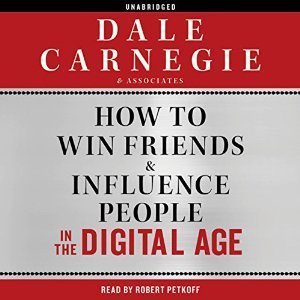
Book Excerpt :
Celebrating the seventy-fifth anniversary of the original landmark bestseller How to Win Friends and Influence People, comes an up-to-the-minute adaptation of Carnegie?s timeless prescriptions for the digital age.Dale Carnegie?s principles have endured for nearly a century. Since its original publication in 1936, his timeless classic How to Win Friends and Influence People has gone on to sell 15 million copies. Now, introducing new listeners to Carnegie?s words of wisdom, comes How to Win Friends and Influence People in the Digital Age, a new guide for a new era.Dale Carnegie could never have predicted the trajectory that new media would take, and the ways that the simple television screen would be adapted into computers and handheld communication devices. He didn?t know the term ?social media? and Facebook was something not even dreamed of in Buck Rogers cartoons. And yet his lessons remain relevant for everyone who communicates online today. In fact, with problems such as cyber
>>> START READING NOW
"This book is available for download in a number of formats - including epub, pdf, azw, mobi and more. You can also read the full text online using our Ereader."
#EPICBOOK, #PDB, #POPULARBOOK2020
0 notes
Text
How to Win Friends and Influence People

Dale Carnegie has written a self-help book on “How to Win Friends and Influence People” in 1936. This book was first published in 1937 in an edition of only five thousand copies. Neither Dale Carnegie nor the publishers, Simon and Schuster, anticipated more than this modest sale. To their amazement, the book became an overnight sensation, and edition after edition rolled off the presses to keep up with the increasing public demand. Over 15 million copies have been sold worldwide, making it one of the best-selling books of all time.
Now to Win Friends and Influence people took its place in publishing history as one of the all-time international best-sellers. How to Win Friends and Influence People became such a phrase, quoted, paraphrased, parodied, used in innumerable contexts from political cartoon to novels. The book itself was translated into almost every known written language. Each generation has discovered it anew and has found it relevant. That’s why I thought I should bring out important highlights and distinctions of the book for the benefit of my readers:
Fundamental Techniques in Handling People ("If You Want To Gather Honey, Don't Kick Over the Beehive")
§ Deepest urge in human desire to be important. So, don’t criticize, condemn or complain.
The human nature is the craving to be appreciated. Give honest and sincere appreciation.
http://www.digitalnavya.com/how-to-win-friends-and-influence-people/
0 notes
Text
Okay X3
Tagged by @carlycmarathecat
Name: Zach
Nicknames: Zachy, Big Mac Zach, Zach Attack, Zach of all trades (All by Coworkers)
Zodiac Sign: Cancer
Height: Almost 6 Foot. Not giving my exact height -~-
Orientation: You mean like Sexual orientation? Well, I’m a male but.....thats all I will say
Favorite Fruit: Do not eat fruits but I like bananas
Favorite Season: Love Summer
Favorite Book: “How to Win Friends and Influence People” by Dale Carnegie
Favorite Flower: No flowers
Favorite Scent: No scents......
favorite color: Blue
favorite animal: Dogs, Foxes,
coffee | tea | hot cocoa: I like coffee but addicted to Iced tea, mainly Arizona
average sleep hours: depends....I get up at different times ^^;
Cat Or Dog Person: Love dogs :3 Especially my 3
Favorite Fictional Character: Bendy <3 (Bendy and the Ink Machine), Stitch (lilo and Stitch)
Number Of Blankets You Sleep With: Um.....one..... >.>
Dream Trip: Always wanted to see Washington DC
Blog Created: Ummm what do you mean by that?
# Of Followers: DA = 657, Tumblr = 129
Random Facts: Love to draw and I like writing. Been writing fanfictions for 6-7 years. Working on a novel which is on the Beta stage, which means I have a test audience before approval. Im hoping to get it published as soon as possible once changes and fixes are in order (do ask me about it if you wish). I also love drawing in cartoon styles and making cartoons like Zach the Fox and Melissa the Rabbit. I’m also majoring a Bachelor in Science for Health Administration, hopefully.
I think I’ll just tag @rainbow-strike @pink-unicorn-boi
4 notes
·
View notes
Text
What Dale Carnegie’s “How to Win Friends and Influence People” Can Teach the Modern Worker
Jessica Weisberg on Dale Carnegie’s best-seller,“How to Win Friends and Influence People,” a book that treated the employee-employer relationship as a sacred, symbiotic bond. In today’s economy, work is structured more like a string of one-night stands.
from Humor, Satire, and Cartoons https://ift.tt/2Guzpta
from Blogger https://ift.tt/2GpLT54
0 notes
Text
John Crosbie was a one-of-a-kind politician, a mix of differences and endlessly fascinated by his home region. He was also, writes John Gushue, a very convenient public official.
When John Crosbie released his stories in 1997, there was a bit of a rush to read the juicy bits. My Life in Politics, which Crosbie wrote with former Globe & Mail managing editor Geoff Stevens, was stacked with them; I recall seeing a couple of people at a store when the book came out, scanning the index of names at the end with their fingers, and flicking quickly to stated pages.
He did not disappoint.
One of my favourite stories in the book is about what went down when a young Crosbie and Clyde Wells decided they had made a devil's agreement by joining Joseph R. Smallwood's cabinet in 1966, and had had enough of what he called ill-judged industrial plans. The final straw was the Come By Chance oil factory, and their disgust with one John Shaheen.
By May 1968, they had had enough. One Monday morning, armed with departure memos, they marched into Smallwood's office.
What did they find? Smallwood was prepared with documents of his own.
"He produced two letters and said, 'I'm dismissing you.' I said, 'Like f--k you are. Here's my letter of departure." Crosbie then flicked his letter at an angry Smallwood.
I believe I am safe in assuming that Clyde Wells — who would have course go on to be premier, a job that Crosbie once wanted but never won — did not use the same kind of language. (Michael Harris, my former editor and the author of Rare Passion, a must-read book about the history of the Crosbie family, noted that while Crosbie had the comfort of the family fortune to fall back on, it was Wells, a 30-year-old lawyer of humble origins and a young family at the time, who took the far biggest risk of standing up to Smallwood.)
The story always spoke to me about John Crosbie, and who he was as a person — not so much about the salty language, but about his opinions.
Crosbie, 88, died Friday morning. He leaves a rich, complicated bequest.
Even though he never led a government, he succeeded in many levels of government, and after leaving politics continued to serve in roles that included lieutenant-governor and chancellor of Memorial University.
Let's talk about his tongue, and his chin.
With the first, he called it as he saw it, and was not afraid of offending people. That rude tongue got him in trouble a lot, even in an epoch that was far more disregarding than now … and much more tolerant of off-colour jokes and insulting language.
That, it has to be said, was part of John Crosbie's life. However, I often was struck at what a walking batch of differences Crosbie was. He sometimes seemed to enjoy provoking women-lovers, yet supported many of their causes (he was a pro-choice Red Tory, and there don't seem to be as many of them anymore).
Cartoonists loved him. His chin was often a focus, and they loved to draw him — he was unique (as finance minister in 1979, he wore mukluks rather than the old notion of a new pair of shoes) and interesting, and constant food for Canada's opinion pages.
Like comedians and impressionists (the key to sounding like Crosbie is the rough sound that comes from the back of the throat, and not the Irish accent that some mainlanders mistakenly adopted), cartoonists were drawn to him like nails to a magnet.
And he loved their exploitation. Rather than be offended, Crosbie's staff would find originals of cartoons. His house in Hogan's Pond, just outside St. John's, is lined with dozens of them.
I first met Crosbie professionally in the mid-1980s, when my first reporting job took me to Ottawa. Crosbie was one of Brian Mulroney's front bench ministers then, and a bit of a darling with the press corps; even on a dry day, Crosbie could be counted on to say something colourful, maybe even offensive. I recall looking at the disorganized struggles around him; they always seemed to be wider than those of most of his peers.
I also remember how the air in the public gallery in the House of Commons would become a little more electric when Liberal MP George Baker would rise from his seat. Baker would often be casting a point at Crosbie, knowing full well Crosbie would fire right back at him. Even sourpuss partners would crack up as they enjoyed political theatre of the very best kind.
Crosbie didn't back down from a fight often, but he wasn't careless with the actions he picked, either. He said it was "fun to tangle" with former prime minister Pierre Elliott Trudeau, whose pride and enjoyment of life he actually liked. There was a famous exchange in May 1983, in which they not only fought about an possible conflict of interest, but did it with Latin — and Greek.
"There is a test which is well known and which I will not insist on but which has been used time out of mind: Quad semper, quad ubique, quad omnibus," said Trudeau, using the Latin phrase that really means something always was, was everywhere, and known by all.
Crosbie didn't miss a beat. "That's the Jesuit coming out," to which Trudeau could not resist an insult. "I know that is beyond the important member for St. John's West."
Crosbie interrupted Trudeau with some Latin of his own: "Res ipsa loquitor" — a well-known legal phrase meaning "the thing speaks for itself." In fact, Crosbie translated it on the floor, to which Trudeau said, "Oh, you don't have to translate it." Trudeau then teased Crosbie in Greek: "Ta zoa etrekhe," which means "the animals are running, before adding, in English, "and that applies to him."
Crosbie closed the exchange — and apparently brought the house down — with the only Greek phrase he could remember. "Andrezesthe krateousthe," which he translated in his journal as "Could you like men be strong."
I talked with Crosbie many times over the years. My favourite interview, by far, happened in the fall of 1989, when I was a young reporter working with the Sunday Express in St. John's. I wanted to write about the legendary rural Liberal leadership race of 1969, when Smallwood cancelled his planned retirement to run against Crosbie to replace himself. I had heard so much about it over the years, and was curious to know more. Smallwood was still alive at the time, but was unable to speak because of a stroke. (I did get to interview Smallwood once, as a Grade 8 student. Story for another time.)
Crosbie was more than game to talk; the question was finding time. We found a Sunday afternoon. I was staying with relatives in Ontario; he was in New Brunswick, in a hotel room with family. As he was propping his feet up, he directed a young child on how to pour Poppy a drink and bring it to him.
We spoke for more than an hour, as he recalled details, spun stories and cracked jokes. The episode interfered with Crosbie's desires to be premier, but played a big part in pushing him to the Tory side of politics. Smallwood's was a winner; in less than three years, the PCs were not only a functional party, but running the government.
Crosbie wanted to lead ("I wanted to premier that badly!" he wrote of why he accepted Smallwood's poisoned-cup invitation to join cabinet in 1966), at both the local and federal level. It's often said Crosbie was the best premier the region never had.
Easy, informed and a bit of a quote machine, Crosbie was a reliable interview. Over the years, especially after his retirement, he was also just fun to talk with. As the Latin and Greek exchange above suggests, he was well educated (he was top of his class as both an undergraduate and a law student), and very well read. On some occasions, just talking, he'd ask about what I was reading. He seemed to read energetically, and widely. To cast him as an adherent with a fixed view on the world would be to misunderstand him completely.
It's worth noting that Crosbie expressed regrets about being so quick with jokes and points. He worried sometimes that people would not take him seriously.
Another favourite moment with Crosbie was the time we found ourselves attending a dinner theatre in Gander. The audience consisted of my family of three. He was travelling with his wife, Jane Crosbie, and an assistant de camp.
Believe it or not, we were the only people in the audience. We all sat together at the same table. I felt bad for the performers, who but put on a show as if the house was full.
The Crosbies were entertaining that night, too. In my view, Jane Crosbie can be at least as bright as her husband. I recall him saying he needed to work at keeping up with her.
At the time, John was fully advancing for his passion project: the memorial to sealers that would be built in Elliston. (It was finally named for him.) Even though it was the height of summer, he was wearing a sealskin vest, a article he wore so proudly and often that it's what often comes to mind when I think about Crosbie.
Crosbie was created for many things, and one of them was an inability to make eye contact. Some people I know found it withdrawing; I guess I and other writers were usual to it. (I remember once searching through a long interview he gave to Anthony Germain to find a frame of Crosbie looking up. I found exactly one moment where he did so.)
At a podium, though, or in a house, Crosbie could give operatic performances: arms waving, head brought back, no sense at all that this man once went to Dale Carnegie courses so he could speak comfortably in public settings.
Notwithstanding the lack of eye contact in conversation, Crosbie could in other cases be at ease. He loved to chuckle — and to tease. A point or two about the mechanisms was the usual way things go. (He would often, I should note, add that his reject was for the national press, or as he put it "the bosses," whoever they were.)
This is how I will remember John Crosbie: a terribly smart, boldly stubborn, deeply dedicated (for his area, especially) and finally warm-hearted man. He was one of a kind.
0 notes
Text
iPods in the Office: Diligence or Diversion?
When he’s not enjoying his downloaded music, from Bob Marley to the White Stripes, he listens to podcasts about Web style. Just recently he plugged his iPod into the workplace’s audio system and shrieked vacation music, much to the pleasure of his fellow staffers.
“ My iPod’s a lifesaver,” states Aplet. “If I’m coding a Web website and I require to be focused and not sidetracked by discussions, I’ll place on a headset and ignore. I’ll simply pound away on the keyboard.”
Aplet, 32 and a previous rock artist, hardly ever separates himself from his iPod, which consists of while he’s at work.
Ignoring to Get Cranking
Workplace drones all over have actually been doing the very same thing for years, and their ranks appear to be growing.
What do employers and coworkers believe about the iPod intrusion? That’s where things can get made complex.
Closing Doors
“ I favor any innovation that can be utilized for home entertainment while looking precisely like work to the casual observer,” jokes “Dilbert” cartoonist Scott Adams in an e-mail interview. “And any home entertainment you can discover throughout a service conference is well worth the danger of being identified.”
A current study by Spherion, a recruiting and staffing business, discovered that almost a 3rd of U.S. employees now listen to music on their iPods or comparable gadgets while on the task. About 80 percent of those employees stated the gadgets enhance their task complete satisfaction and performance.
Is listening to music at work actually an increase to efficiency, they question, or is it an interruption?
What about security concerns? Is it possible for an unhappy employee to download delicate business details as quickly as he can a tune from iTunes?
Some business, usually smaller sized, tech-oriented companies, are great with their workers shooting up iPods and MP3 gamers on the task. A couple of, consisting of worldwide companies like National Semiconductor and Capital One Financial, have actually even bought them wholesale for workers who can utilize them to listen to training sessions and other business interactions at their desks, while taking a trip or perhaps in the house.
Does plugging into an iPod isolate listeners from their colleagues, closing down natural interaction and driving wedges in between more youthful staff members and their less-technologically smart associates? Will a staff member who is involved a Jordin Sparks tune hear her telephone, or a smoke alarm?
‘ You’ve Got to Be Careful’
“ It appears great if an individual is flying solo, like an information-technology service technician who invests a great deal of time in transit to user websites,” Robin states. They’re “security no-nos,” he states, in other cases.
Not all business are delighted about the intrusion of the iPod individuals.
The Spherion study, performed by Harris Interactive (Nasdaq: HPOL), discovered that more youthful employees are probably to listen to music on their iPods while working. Nearly half of grownups ages 25 to 29 state they do so, compared to 22 percent of employees ages 50 to 64.
Those iPods, MP3 gamers and so on appear to be most frequently utilized amongst employees with “more tedious tasks,” like filing and copying, and singular tasks that need little interaction with associates or the general public, states Brett Wiatre, Spherion’s Western area director of operations.
Inquired about iPods at Intel (Nasdaq: INTC) in Folsom, Calif., business representative Teri Munger stops briefly.
“ In that sort of specific niche circumstance, the music appears to keep individuals inspired and moving,” Wiatre states.
Not All Workplaces Right for iPod
Daniel Robin, a work environment specialist in Santa Cruz, Calif., concurs that the gadgets have their location at some work websites.
“ They’re terrific gadgets,” states Barbara Pachter, an office-etiquette and interactions expert in New Jersey. “With all of these sort of innovations, however, it’s about how you utilize them in your private work area. You’ve got to beware.”
“ I have actually never ever seen anybody with an iPod in the work environment,” a minimum of in her structure, she states.
The small gamers are not as harmless as they look, some business firmly insist, and raise some severe work environment concerns.
At others? Not a lot.
“ What if you can’t hear a forklift approaching?” Robin asks.
Or a coworker grumbling?
“ Even if your workplace sanctions iPod usage, very first consider your particular position and objectives,” Dale Carnegie’s Web website checks out. “Are you brand-new and attempting to form excellent working relationships?
“ The ‘professional’ part of it is that their music does not truly trouble other individuals, and it might assist some individuals focus,” states Pachter, coauthor of the book New Rules@Work ($ 13.95, Prentice Hall, 272 pages).
The most terrific and annoying feature of iPods in the workplace, states Pachter, is their capability to cut employees off from the real life.
“ The drawback is that individuals get so captured up in what they are listening to that they do not hear others speaking to them. When their headsets are on, it’s difficult to inform if they’re listening to you, or listening to their music. It drives me insane!”
iPod seclusion
Dale Carnegie Training takes the matter a bit more seriously. The business encourages care when utilizing iPods at work.
“ Still, anything that makes your colleagues less most likely to talk with you needs to be an advantage,” he jokes.
“ The iPod might separate you and prevent interaction with others.”
“ Dilbert” developer Adams, who has actually satirized the phenomenon in his hugely popular cartoon about life in the work cubicle, states he questions that anybody “is more efficient with interruptions than without.”
Setting Policies
“ I’m a marketing individual, and I like communicating with individuals around me,” she states. “I just utilize my iPod when I exercise.”
“ We have an extremely varied set of individuals, and they listen to all sort of various music,” she states. “In a cubicle environment where individuals keep their own area and require to concentrate on what’s right in front of them, it exercises fantastic.”
“ Some of our customers prohibit them,” he states. “Others are setting policies particular to the task and the workplace. We motivate companies to set recognized, constant requirements, so that there are no misconceptions.”
Wiatre of Spherion states some business are setting policies about when and how iPods can be utilized on the task, simply as they have actually put limitations on using mobile phone and other individual technological gadgets.
For software application designers or code authors, anyhow. Nealon herself leaves her iPod in your home.
At Intel, the choice about whether utilizing iPods is suitable depends on private supervisors, states Munger. Typically, it’s appropriate if “work is not affected, workers are acting in a safe way and their cube mates are not being sidetracked,” she states.
Folsom start-up SynapSense has no such policies. The majority of its 40 workers, who come from such remote locations as South Africa, India and Barbados, welcome iPods at work, states representative Patricia Nealon.
0 notes
Text
Books every Entrepreneur should read!
“If I have seen further it is by standing on ye shoulders of Giants.” -Isaac Newton
1. Good to Great: Why Some Companies Make the Leap…and Others Don’t by Jim Collins
Jim Collins wanted to answer one very important question, "Can a good company become a great company and if so, how?" After examining more than 1,400 companies, Collins and his researchers settled on 11 companies that include Wells Fargo, Gillette, and Walgreens. He then analyzed these companies to find out what makes them great.
2. The A.D.D. Entrepreneur by Matt Curry
Curry, a successful entrepreneur, takes a look at his own experiences with A.D.D. and turns the tables on the common misconceptions that this is a problem. Instead, Curry makes the argument that A.D.D.can be used by entrepreneurs as an opportunity through insights, strategies, and enthusiasm.
3. The 4-Hour Workweek by Timothy Ferriss
This has become a must-read book for anyone wanting to get out of the daily 9-to-5 grind. Ferriss will guide you along into creating and automating your very own income generator is that you’ll have the time to do the things that you’re really passionate.
4. The Startup Playbook: Secrets of the Fastest-Growing Startups From Their Founding Entrepreneurs by David Kidder
Author David Kidder examines the lessons and experiences from 41 different startup founders. The result? Insights into what made them successful like finding their niche or leadership techniques.
5. The Innovator's Dilemma: The Revolutionary Book That Will Change The Way You Do Business by Clayton M. Christensen
What happens if your company has played by the rules, found some success, and still doesn’t last? Harvard professor and business founder Clayton M. Christensen argues that to find success, you should change your common perception of how to conduct business by not always listening to your customers and how to know when to pick a smaller market over a larger one.
6. Guide to the Bodhisattva's Way of Life by Shantideva
This translation of the 8th Century poem isn’t just for Buddhists, but anyone hoping to find inner peace, practice patience, or learn how to concentrate on the profound subjects that matter most to us.
7. Like a Virgin: Secrets They Won’t Teach You at Business School by Richard Branson
Can a business book actually be entertaining? When it’s written by Sir Richard Branson that feat can actually be accomplished. In this book, Branson uses anecdotes and case studies, Branson provides a roadmap for success through strategies like thinking big and building small, as well as having empathy for employees.
8. As A Man Thinketh by James Allen
This collection of essays written by James Allen has become a timeless classic that is often read by anyone looking to unlock the secrets of success thanks to one simple philosophy; You are what you think.
9. Endless Encores: Repeating Success through People, Products, and Profits by Ken Goldstein
If you’re an entrepreneur or small business owner who has previously experienced success do you know how to replicate that success? Ken Goldstein introduces us to a successful businessman who runs into a successful CEO at the airport who shares her secret of success; consistent achievement.
10. The Fire Starter Sessions by Danielle LaPorte
Looking for the motivation to get started on your next project? Look no further than this passionate and inspiring book from Danielle LaPorte, the creator of The Desire Map: A Guide to Creating Goals With Soul. In it she describes the importance of doing what you love and why you should be generous.
11. True North: Discover Your Authentic Leadership by Bill George and Peter Sims
If you need some assistance with discovering your own leadership style, this book will help you shape your own vision, values, and motivations through interviews with 125 of the top leaders in the world.
12. The Lean Startup: How Today's Entrepreneurs Use Continuous Innovation to Create Radically Successful Businesses by Eric Ries
Instead of spending your time creating an elaborate business plan or relying on a focus group, entrepreneurs need to continuously test their business ideas and be willing to adapt quickly in order to stay competitive. Erics' book was a driving factor behind me starting my current company Due.
13. The 7 Habits of Highly Effective People by Stephen R. Covey
What makes some entrepreneurs more successful than others? It’s likely that they have developed principle-centered solutions to business problems, such as being able to adapt.
14. How To Win Friends and Influence People by Dale Carnegie
This masterpiece is the essential read for anyone wanting work on their people skills, like the three fundamental techniques when handling people.
15. Performance Breakthrough: The Four Secrets of Passionate Organizations by Mike Goldman
How do you get other people to get as passionate as you are about your organization? You can learn how thanks to Mike Goldman’s four secrets that will help your create a passionate, productive, and profitable organization.
16. The $100 Startup by Chris Guillebeau
You don’t have to have a large amount of money to launch a business. You can actually do so by turning your passion or hobby into a successful business since you probably already know your market - which means you can cut-out conducting market research.
17. The Startup of You: Adapt to the Future, Invest in Yourself, and Transform Your Career by Reid Hoffman
Written by LinkedIn founder Reid Hoffman, this book describes how you can take control of your life and career so that you can make the most of it.
18. The Art of the Start: The Time-Tested, Battle-Hardened Guide for Anyone Starting Anything by Guy Kawasaki
If you need inspiration and techniques to jumpstart your business, then this is a must-read from Guy Kawasaki, former marketing maven of Apple Computer. For example, Kawasaki demonstrates how to give a strong presentation with the 10-20-30 rule.
19. Think and Grow Rich by Napolean Hill
First published in 1937, this is another timeless success book that should on every entrepreneur's bookshelf. Inspired by an interview with Andrew Carnegie, Hill discovered that successful people embrace the Philosophy of Personal Achievement.
20. Getting Beyond Better: How Social Entrepreneurship Works by Roger Martin and Sally Osberg
Entrepreneur’s are striving to make the world a better place, whether through eliminating climate change or poverty. Besides making a difference in people’s lives, entrepreneurs can also make a profit by doing the right thing. Martin and Osberg will help you discover how social entrepreneurs are discovering problems and transform the system.
21. Zero to One: Notes on Startups, or How to Build the Future by Peter Thiel
This bestseller from PayPal co-founder Peter Thiel examines how entrepreneurs can shape the future by having the right team in place, knowing whether or not your business will be in business 20 years from now, or if you offer something unique.
22. The Entrepreneurial Spirit Lives: 25 Tales to Help Entrepreneurs Start, Grow, and Succeed in Small Business by Cavanaugh L. Gray
Lifelong entrepreneur Cavanaugh L. Gray describes how small business owners can overcome common obstacles like management and marketing in a practical and comprehensive, but easy-to-understand, way through inspiring stories of successful businesses.
23. The Simplicity Cycle: A Field Guide to Making Things Better Without Making Them Worse by Dan Ward
What business owner wouldn’t want to simplify their lives? Author Dan Ward outlines a number of tools and techniques that can help us identify and resolve the complexity problem.
24. Ignore Everybody: and 39 Other Keys to Creativity by Hugh MacLeod
Copywriter Hugh MacLeod argues in his first book that creativity should be used when starting and running a business. MacLeod makes the case, using his own cartoons as an example, that businesses shouldn’t do what everyone one else and create their own business models.
25. Awaken the Giant Within by Tony Robbins
Bestselling author, entrepreneur and philanthropist Tony Robbins details in this book how we can take control of the mental, physical, and emotional factors that are a part of decision-making so that we can plan and achieve personal and professional goals.
0 notes